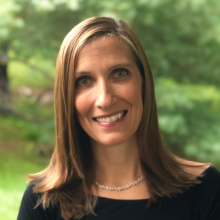May 2008 Spotlight on the SRCD Policy Fellow: Layla Esposito, Ph.D.
2007-2008 Federal Executive Branch Policy Fellow
I am currently in the first year of my SRCD fellowship at the Eunice Kennedy Shriver National Institute of Child Health and Human Development (NICHD). This placement has afforded me a great learning experience, especially because the structure of the fellowship allows me to rotate to different departments based on my interests and skills. Thus far, I have worked in the office of Program and Public Liaison, Extramural Policy, and the Division of Scientific Review. In addition, I am involved in various projects in the Child Development and Behavior Branch, the Endocrinology, Nutrition and Growth Branch, the Contraception and Reproductive Health Branch, and the Demographic and Behavioral Science Branch. I have also had the opportunity to work across NIH with different Institutes and Centers. These experiences have given me a better understanding of how NIH functions, how the Executive and Congressional branches co-operate, and the intricacies of policy making.
During my fellowship, I have taken on the role of coordinator of the new NICHD Obesity Research Strategic Core (ORSC). The mission of the ORSC is to promote a multilevel approach to studying childhood obesity, to serve as an advisory body to the NICHD on obesity-related activities, and to facilitate the implementation of a Global Multi-level platform to address childhood obesity with national and international organizations. Given the steep rise in childhood obesity in recent years and the links to serious and chronic health problems, coordinating this group is giving me a unique opportunity to work toward ameliorating an urgent health crisis from the beginning stages. My role allows me to work with different scientists across NICHD, NIH, and other national and international organizations. The most important lesson I have learned so far is how a seemingly simple problem like obesity (energy intake exceeding energy expenditure) is actually extremely complicated, involving local, national, and international policy. For example, obesity is significantly related to socioeconomic status, world wide food prices and subsidies, the built environment, the invention of new technologies, and the processing of food.
Because the NIH uses the majority of their budget to fund external grants, NICHD fellows are required to spend a rotation in the Division of Scientific Review. I worked closely with a scientific review administrator on two grant reviews. I was responsible for assisting in the administrative review of each application, selecting expert reviewers, attending the reviews and taking notes, and finally writing the summary of discussion for the applicants. Having the opportunity to see how grants are reviewed was an experience that I feel privileged to have been a part of. These lessons will undoubtedly assist me with future grant writing, as well guiding other researchers through the grant process when I receive my own grant portfolio later this year.
During my time at NICHD, I have been able to work on a large variety of projects which have greatly expanded my knowledge and interest in topics related to child health and human development. Many of these are related to childhood obesity, including an upcoming workshop that I am helping plan on feeding the family. This workshop will focus on examining how social science can best inform obesity research. I am helping plan an upcoming workshop on the role of physical activity and outdoor adventure in preventing substance abuse in youth. Another interesting and exciting project I am involved in looks at the health benefits of pets and the human-animal companion bond. I am also assisting writing an RFA on contraception and planned pregnancy. In addition, I spend much of my time writing scientific pieces, as I have been fortunate enough to be involved in a series of journal articles and a book chapter.
I truly appreciate the experience that the SRCD policy fellowship is providing. I have learned so much about the intersection of policy, science, and the public in my short time; I know my understanding of these complex issues will continue to exponentially grow during my fellowship.
